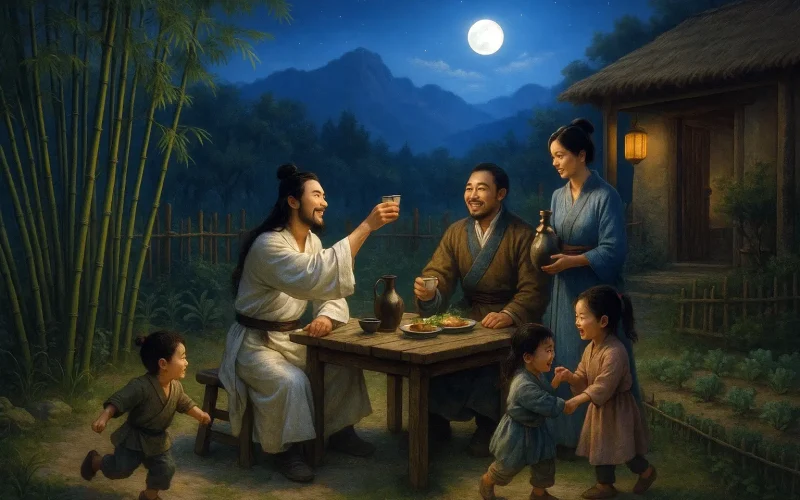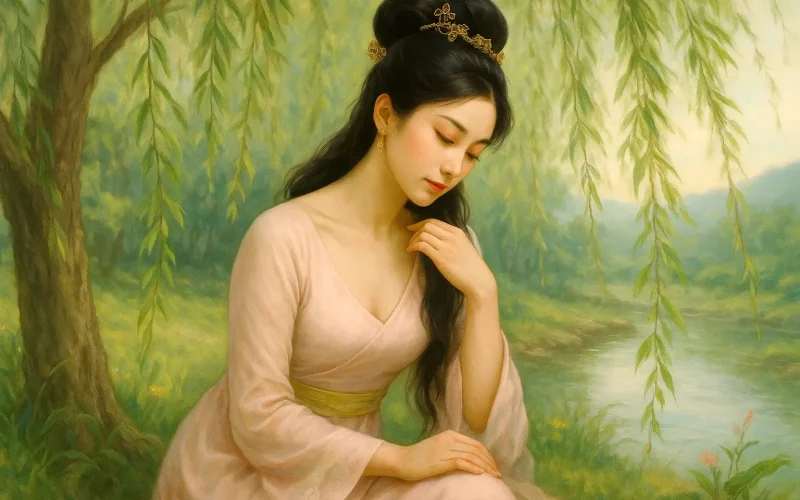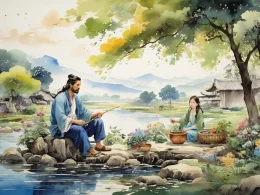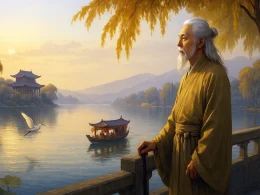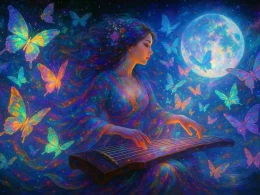From a pot of wine among the flowers
I drank alone. There was no one with me -
Till, raising my cup, I asked the bright moon
To bring me my shadow and make us three.
Alas, the moon was unable to drink
And my shadow tagged me vacantly;
But still for a while I had these friends
To cheer me through the end of spring.
I sang. The moon encouraged me.
I danced. My shadow tumbled after.
As long as I knew, we were boon companions.
And then I was drunk, and we lost one another.
...Shall goodwill ever be secure?
I watch the long road of the River of Stars.
Original Poem
「月下独酌 · 其一」
李白
花间一壶酒,独酌无相亲。
举杯邀明月,对影成三人。
月既不解饮,影徒随我身。
暂伴月将影,行乐须及春。
我歌月徘徊,我舞影零乱。
醒时同交欢,醉后各分散。
永结无情游,相期邈云汉。
Interpretation
This poem was composed during Li Bai's political disillusionment, when he increasingly felt the rarity of true companionship in the world, finding solace only in the moon and his shadow. Through wine and imagery, he projects his solitude onto the cosmos. Though themed around solitary drinking, the poet fantastically conjures the moon and shadow as "companions," revealing a transcendent nonchalance tinged with inescapable loneliness.
First Couplet: "花间一壶酒,独酌无相亲。"
huā jiān yī hú jiǔ, dú zhuó wú xiāng qīn.
A flask of wine amid the flowers. Drinking alone, no kin for hours.
This establishes the poet's isolation, with "drinking alone" striking the poem's emotional keynote.
Second Couplet: "举杯邀明月,对影成三人。"
jǔ bēi yāo míng yuè, duì yǐng chéng sān rén.
Raising my cup, I beckon the moon. With my shadow, we're a trio soon.
Ingeniously crafting imaginary company, the poet consoles himself with lunar and shadow companionship, betraying profound solitude beneath the whimsy.
Third Couplet: "月既不解饮,影徒随我身。"
yuè jì bù jiě yǐn, yǐng tú suí wǒ shēn.
The moon doesn't drink after all. My shadow just mimics my sprawl.
Reality intrudes on the fantasy—the companions prove illusory, deepening the isolation.
Fourth Couplet: "暂伴月将影,行乐须及春。"
zàn bàn yuè jiāng yǐng, xíng lè xū jí chūn.
For now, with moon and shadow I stay. Seize spring's joy before it fades away.
The carpe diem resolution carries undertones of ephemerality's melancholy.
Fifth Couplet: "我歌月徘徊,我舞影零乱。"
wǒ gē yuè pái huái, wǒ wǔ yǐng líng luàn.
I sing—the moon lingers near. I dance—my shadow careers.
Personification animates the scene: the moon lingers as audience, the shadow careers in chaotic mimicry, creating a rapturously unbridled atmosphere.
Sixth Couplet: "醒时同交欢,醉后各分散。"
xǐng shí tóng jiāo huān, zuì hòu gè fēn sǎn.
Sober, we share revelry. Drunk, we part inevitably.
This contrast between sober union and drunken dispersal mirrors life's impermanent connections.
Seventh Couplet: "永结无情游,相期邈云汉。"
yǒng jié wú qíng yóu, xiāng qī miǎo yún hàn.
Let's bond beyond mortal ties. Meet again where starry rivers rise.
The celestial conclusion aspires to a transcendent camaraderie, free from earthly fickleness.
Comprehensive Analysis
The poem's singular conception and exquisite imagery transform loneliness into lyrical sublimity. By summoning the moon and shadow, the poet alchemizes isolation into artistic defiance. Yet beneath this bravado pulses acute melancholy, rendered more poignant by the oscillation between revelry and solitude.
Artistic Innovations
- Unconventional conceit: The imagined moon-shadow fellowship refreshes a conventional theme.
- Philosophical contrast: The sober-drunk dichotomy mirrors life's ephemeral connections.
- Kinetic rhythm: Alternating between exuberant verbs and melancholic resolutions creates dynamic cadence.
- Symbolic personification: The anthropomorphized moon and shadow become vessels for existential meditation.
Insights
Beyond expressing solitude, the poem models self-sufficient creativity—turning absence into aesthetic plenitude. Li Bai's lunar pact suggests that when human bonds fail, art and nature offer alternative kinship. The poem's enduring magic lies in this alchemy—transforming leaden loneliness into golden verse.
Poem translator
Kiang Kanghu
About the poet

Li Bai (李白), 701 - 762 A.D., whose ancestral home was in Gansu, was preceded by Li Guang, a general of the Han Dynasty. Tang poetry is one of the brightest constellations in the history of Chinese literature, and one of the brightest stars is Li Bai.







